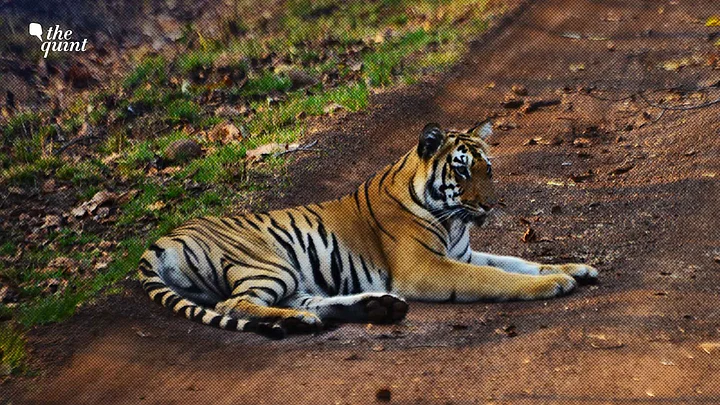In a world where life can often feel like a circus with too many clowns and not enough popcorn, there exists a species that seems to have cracked the code to the good life: tigers in India.
Yes, you read it right! While we humans are busy navigating the complexities of existence, our striped feline friends are lounging in luxury, enjoying perks that would make even the most pampered socialite green with envy.
Ever since my return from Pench and Tadoba National Parks in central India, I have been praying fervently to be reincarnated as a tiger in a national park in my next life, where my only worries would be to finding a shady corner to nap and avoiding pesky tourists’ cameras.
The Luxurious Life of the Majestic Beast
Tigers in India's national parks are living the dream with the crème de la crème of accommodation. Forget about sky-high rent prices and cramped apartments – these majestic beasts have been assigned sprawling territories replete with lush forests, pristine lakes, and panoramic views that would make any Airbnb host jealous.
With nice trails to roam and explore, it's no wonder they are always so agile and fit. Who needs a gym membership when you have the great outdoors as your playground?
Tigers have it all. An army of armed rangers provides them complete protection. Their trails are well maintained, regularly broomed, and have no potholes or waterlogging. Freshly dug canals channelise rainwater to their favourite waterholes. In case the rains fail, solar-powered submersible pumps serve as a backup.
In India, one gets to at least feast their eyes on these beasts sipping on fresh, clean water without a care in the world. However, they are bound by strict rules in place to ensure their well-being.
Dwelling in a 'No Cellphone' Zone
If His Majesty is sitting on the trail, you are not allowed to drive past him. Entering the Navegaon Safari Gate to approach Tadoba’s core area, we found a two-year-old tiger cub lounging on the track, counting his blessings, and waiting for the careless langurs swinging in the tree above to fall into his mouth. He detained us for ninety minutes before deciding to break his fast on a swamp deer freshly killed by his sibling a short walk away.
Cellphones? Not allowed in their territory. Inside Pench, there is no "signal”. If you are caught using a cellphone in Tadoba, you will have a pay a hefty fine of Rs 10,000 – as an American visitor found out while we were there.
It's like living in a perpetual silent retreat, free from the incessant buzz of notifications and social media drama. No wonder the tigers seem so serene and composed.
But wait, there's more! While humans face the imminent threat of the death penalty for their crimes, tigers can rest easy knowing that there's no such thing as capital punishment in their world. Sure, they might face the occasional skirmish with rival males or territorial disputes, but it's nothing compared to the legal labyrinth that we humans have to navigate.
In Tadoba’s Nimdhela Gate buffer zone, we saw another two-year-old cub who had already killed two humans. Unconcerned, he was sleeping soundly.
Courtesy of Mother Nature, tigers can avail free medical care. If they fall sick or have an upset tummy, they chew on the bountiful grass, puke their guts out – and are good to go. Who needs health insurance when you have a natural pharmacy at your disposal?
Dominating The Food Chain
And let's not forget about the perks of being at the top of the food chain. Tigers are apex predators, which means they get to dine on the finest cuisine the jungle has to offer – deer, wild boar, langur, and sometimes even buffalo if they are feeling fancy. Stuck with our mundane grocery runs and cooking routines, it's enough for some of us to want to trade our dal bowl for a steak dinner.
In spite of all the welfare measures and financial largesse doled out to them, the tigers are not subjected to look at the posters or hoardings of deification-seeking politicians reminding them of their generosity or guaranteeing them acche din, the good life. Thankfully, tigers do not have a vote – so there is no need to involve them in welfare politics.
But perhaps, the greatest advantage of being a tiger in India is the respect and admiration they command from humans. They are the undisputed rulers of the jungle, revered in folklore and worshipped as gods by some sects. Jai Sheron Wali Mata!
Meanwhile, we humans are constantly chasing after validation and approval, seeking likes and followers to fill the void of existential emptiness. It's a rat race, and tigers have wisely chosen to sit it out from the sidelines.
In the grand scheme of things, perhaps it's better to be a tiger than a human being in India. As they say, it's a jungle out there – and tigers are living proof that sometimes the wild side is where the grass is truly greener.
Here's a glimpse from the trip for the readers to enjoy:
(Akhil Bakshi, an author and explorer, is a Fellow of the Royal Geographical Society and Explorers Club USA, and Editor of ‘Indian Mountaineer’. He is also the founder of Bharatiya Yuva Shakti, an organisation that ensures good leadership at the village level. He tweets @AkhilBakshi1. This is an opinion piece, and the views expressed are the author’s own. The Quint neither endorses nor is responsible for them.)
